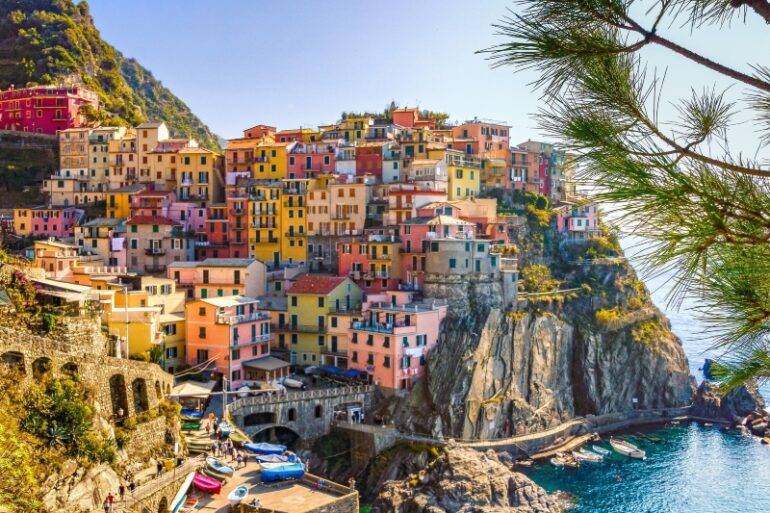Disney’s new movie Luca tells a heart-warming tale of friendship, adventure and inclusion set in a picturesque, fictional Italian town in the 1950s.
By Silvia Vacchelli
As an Italian, when I first heard that Pixar was producing a new film set in Italy, I was thrilled – and very sceptical. Pinocchio was released 81 years ago and it was high time they made a new, modern Italian cartoon. However, I was afraid it would be another product of American-Italian culture, very stereotypical and very un-Italian, just like Super Mario, Spaghetti and Meatballs and Fettuccine Alfredo. I couldn’t have been more wrong!
Luca tells the story of a young sea monster who lives with his family under the sea near a small Italian town. Luca doesn’t enjoy his monotonous life and is really curious about the human world, but his parents forbid him to leave the safety of the water. When they threaten to send him to the deep sea with his uncle Ugo, Luca runs away from home. He then meets Alberto, another young sea monster who lives by himself on a small island. Alberto is brave and full of ideas and teaches Luca to silence his inner »Bruno«, that voice that reminds him of his fear and doubts. Together they decide to go undercover to explore the human town and to participate in a small triathlon race with their new human friend Giulia. The young sea monsters go on a memorable adventure, but they have to be careful not to blow their cover, since the town’s inhabitants are not sea monster-friendly.
Setting
The film is set in a fictional Italian sea town in the region of Liguria called Portorosso, a witty mix of the existing cities of Monterosso and Portofino. I was surprised by the extreme attention to detail: those colourful houses, the name of the shops painted on slightly peeled walls and newspapers written in Italian brought me back to my own trips in Liguria. I also appreciated the choice of setting it in the 50ies/60ies, a time in which technology was almost non-existent and children enjoyed their summer swimming and riding their bikes instead of constantly staring at their phones.
The perfect description of the setting is given by the producer Andrea Warren: »a postcard you can jump into«. Portorosso is not only visually pleasing but also very much alive with kids kicking a ball in the main square and old people playing cards on wonky tables on the streets. If I had to name the most unrealistic aspect of the film, it would be the friendliness of Ligurian people who are renowned for their stinginess and their grouchiness, but, oh well, it’s a Disney movie.
Characters and Italian Voices
I love that the names of the sea monster-people are all based on actual Italian fish or sea creatures’ names, like Luca Scorfano (rockfish) and Alberto Paguro (hermit crab). In general, the characters are well rounded, with believable virtues and flaws. Since I am an anxious overthinker who craves adventure, I could relate the most to Luca’s struggle to find his way in life and his fear of breaking the rules. I could also see my younger self in the energetic and stubborn Giulia and I envied Alberto’s carefree lifestyle, even if it is a way to hide his loneliness and traumatic past. However, my favourite character, apart from the grumpy cat Macchiavelli, is the weirdo Uncle Ugo, with his almost transparent body, his wandering eyes and the wail carcass’s story.
Luca
USA/Italy 2021
95 minutes
Director: Enrico Casarosa
Starring: Jacob Tremblay, Jack Dylan Grazer, Emma Berman, Maya Rudolph, Marco Barricelli, Jim Gaffigan
I wasn’t sure whether to watch it in English or in Italian, but I was really curious to hear the accents of the English voice actors. To be honest, I was overall satisfied with their work, even if I would have appreciated having more Italian or Italian-American actors as they did for the character of Ercole, the town bully, who was dubbed by Saverio Raimondo. However, surprisingly they put many words or sentences in Italian that made up for the imperfect pronunciation.
Moreover, the sentences in Italian were not stereotypical, so that I didn’t have to hear a single »mamma mia« but different funny variations of real or plausible Italian catchphrases, like Giulia’s »santa mozzarella« and »santo gorgonzola« (which are not real Italian exclamations) and Ercole’s »porca paletta« (a real one that I sometimes use too). The cherry on top was Bennato’s song »Il Gatto E La Volpe« (»The Cat And The Fox«) in the soundtrack; this tune does not only perfectly fit the playful and slightly mischievous friendship between Luca and Alberto. It also hints at the only other Italian Disney film, since the song is a tribute to Pinocchio’s wicked Cat and Fox duo.
Message
I have read people say that it is just a remake of The Little Mermaid and the message is the same. I can’t disagree more, The Little Mermaid is all about sacrifice and choosing one word over the other, while Luca is about the opportunity of choosing your best life without necessarily changing your identity since sea monsters can easily shapeshift into humans. Luca also promotes a message of inclusion and friendship, about how people don’t have to look the same or want to live the same life to be friends.
In its simplicity, this film tells the story of a real friendship, having fun together and pushing each other to overcome insecurities, but also accepting the other person (or sea monster) for what they are and supporting their passions – even if that means putting someone else’s happiness before one’s own. So, grazie Luca for making my heart all warm and fuzzy and for showing the world a realistic and nostalgic picture of Italy!






